
Many decades ago, the idea of climate change was considered pure science fiction, with stories of ice ages, volcanic eruptions, and rising sea levels serving as the ultimate apocalyptic setting.
These days, as the temperatures rise, our glaciers melt and the earth shares the occasional dissatisfied grumble with our treatment of it – the possibility becomes more of a reality by the day.
This ever-increasing rise in climate catastrophe is breathing new life into the sci-fi arena and as such it has given way to a whole new genre: Cli-Fi – science fiction based entirely on the premise of climate change.
Whether the world is engulfed in ice, ancient viruses awaken from permafrost or nuclear war threatens to change the world forever, humanity always finds a way to prevail and even finds an odd bit of humor in it.
Below we take a look at how TV show producers and writers are taking on the future with a look at some of the best climate fiction TV shows.
Extrapolations, Apple TV+ (2023 – present)

This 8-episode limited series is an anthology of touching stories that focus on how humanity is dealing with the effects of climate change.
Across the planet we meet different characters who are challenged by their changing environment, whether it is a matter of faith or science, these loosely connected humans each have a point of view that the show wants to explore.
Each episode is set slightly in the future, and follows a different year in the coming climate crisis, whether it is 2037 and the world is slowly falling into anarchy through protests and rising temperatures, or 2059 as eco-warriors are desperate to turn the fate of the planet around.
The show is a delicate and often emotional look at climate change and the human cost thereof, and it will be devoured in one sitting if you’re not careful.
The Ark, Syfy (2023 – present)
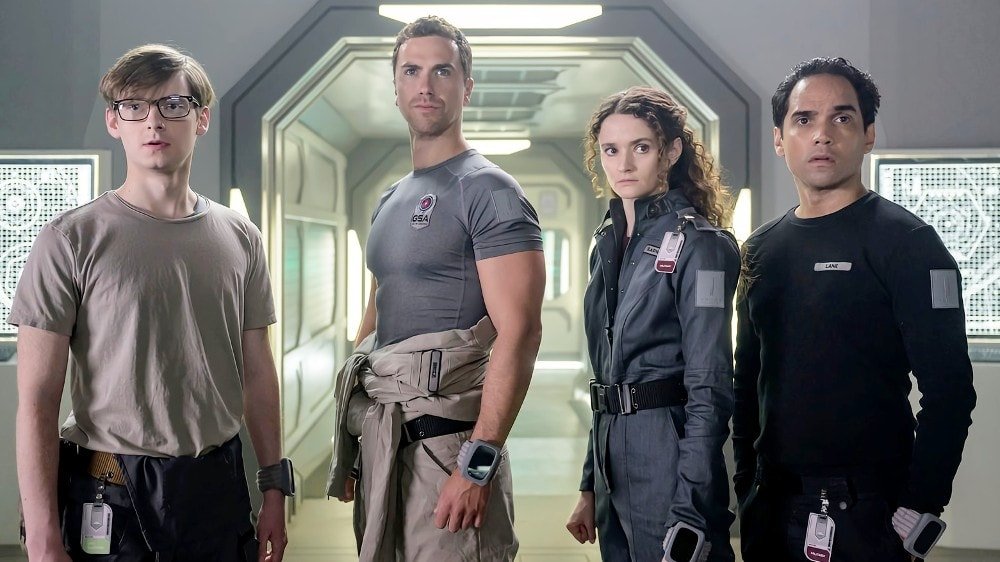
Aboard a spacecraft known as Ark One, a group of interplanetary explorers are sent on a mission to find a habitable home for humanity.
Earth has become increasingly inhospitable due to climate change, and we humans need to find a new planet to colonize.
After something destroys part of the ship, the survining passengers wake up a year earlier than anticipated from their cryo-sleep, leaving them with very little in the way of survival supplies.
The story picks up with the core group who not only have the fate of all humanity on their backs, but their own continuance until they reach their destination planet too.
Together they overcome and work together and rely on each other’s strengths to persevere.
The Commons, Stan (2019)

Set in the near future, where climate change has already begun to wreak havoc in Sydney Australia, we meet Eadie, a brilliant neuropsychologist.
Amidst an intensely claustrophobic atmosphere emphasized by orange and sickly sepia hues, we learn about her dream to conceive a child and see the world through her eyes and those of her patients and family members.
She employs an augmented reality approach to her patients and takes them to a simulation called “The Commons”; a space where they can experience greenery and peace in contrast to the current state of the world.
Although the show takes on a myriad of themes such as acid rain and diseases that thrive in the heat, at its core we are driven by Eadie’s desire to have a child and the ethical consideration of bringing new life into such a polluted and broken world.
The Head, HBO Max (2020)
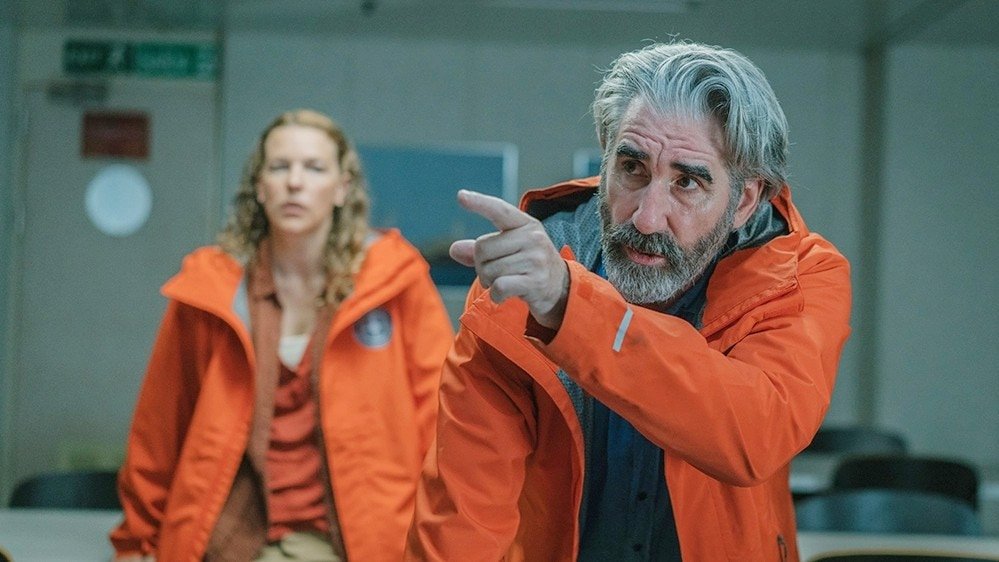
In the battle against climate change, research is at the top of the hierarchy, and in The Head, we meet a team of brave researchers (The Winterers) who take on the brutal six-month winter of the South Pole to continue their studies into climate change at the behest of Arthur WIlde – a leading figure in the field of biology.
As most of the staff leave the Polaris VI Antarctic Research Station, the show shuts the door on a long sunless winter.
However, the opening of this thriller is a bit of a red herring, as the show quickly moves to Spring and we discover that most of the researchers are either dead or missing!
Thus begins an investigation into one of the iciest serial killers to grace TV screens.
With a missing wife, a traumatized survivor, and a new team member, Commander Johan Berg has until the turn of the next sunless winter to solve the crimes he came across.
Occupied, TV2 (2015 – 2020)
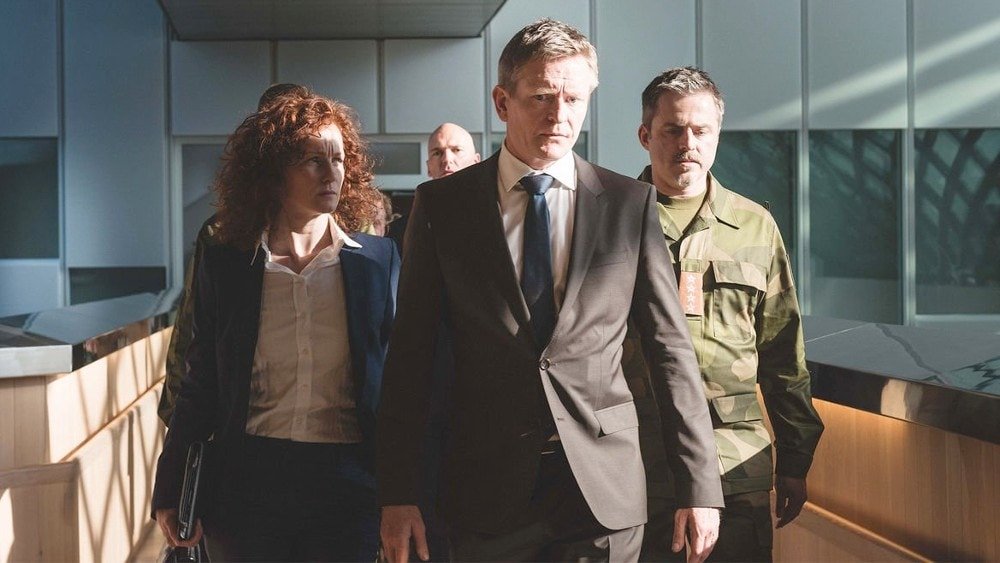
Climate change is not just a scientific arena, political tensions can arise from a changing planet just as quickly, and in Occupied (Okkupert in Norvegan) we take a look at how quickly a divide can arise when countries no longer agree on climate and environmental policies.
Once again set in a not-so-distant future, Norway is under occupation from Russia as a result of the country’s environmentally friendly policies.
Profit is the name of the game and when a country ceases its oil and gas production, the European Union steps in to send in Russia.
The show is incredibly thrilling, with political themes and messages about human greed in spades.
In Occupied, the world is in crisis – we are dependent on gas and oil, there’s a fuel crisis on the rise due to the Middle Eastern war, and Norway is the last reservoir of these fossil fuels. Gripping and terrifying for its realism, this Norwegian gem is a must-see.
Years and Years, BBC One (2019)

With one of the most innovative premises on this list, Years and Years is a family drama set in a dystopian science fiction universe.
In six episodes we follow the Lyons family over 15 years of climate change, political turmoil, and economic disasters.
As Donald Trump wins a second term, and a British celebrity turned politician rocks the British stiff upper lip with a hugely controversial take on live television, the show narrows in on the day-to-day life of this ordinary Manchester-based family.
Can Britain be brought back from the brink of a dictatorship and will this normal family be the key?
Tune in and find out for an absolutely riveting and deeply emotional science fiction saga.
The Expanse, Syfy (2015 – 2022)
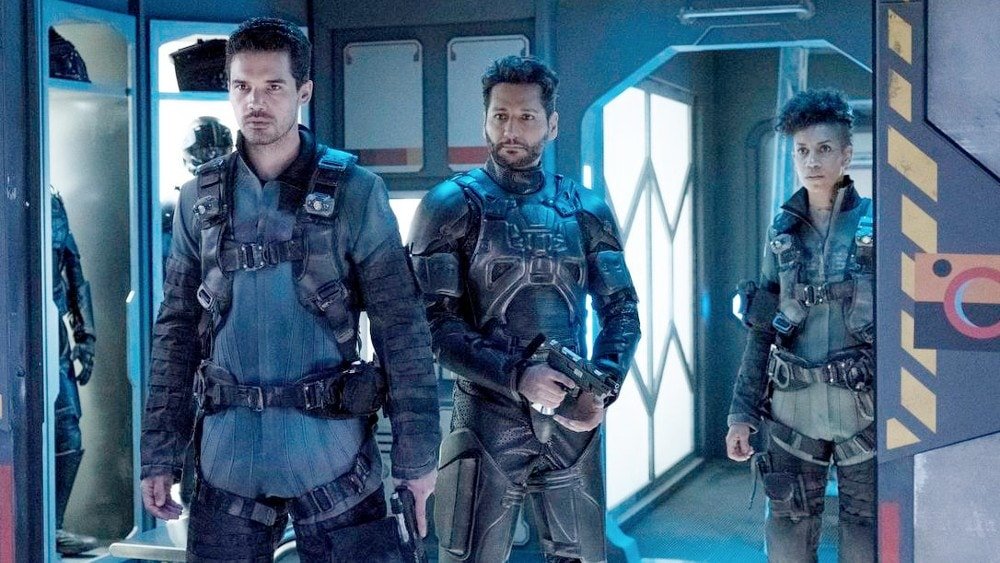
Based on the popular book series of the same name, in The Expanse, humanity is faced with overpopulation and climate issues that spur on the exploration and colonization of the rest of the solar system.
Each part of the solar system has its own problems, such as the goal of terraforming Mars never reaching completion, or the scarcity of water in the asteroid belt mining operation.
This is all a backdrop to the real story of the show, which is the discovery of alien technology, and how different parts of the solar system are competing over the resource, with each sub-group not wanting to share it with anyone else.
At its core though, The Expanse shows us that we cannot outrun the flaws of being human and that our tendency to be destructive can follow us across the universe if we allow it.
Terra Nova, Fox (2011)

What if we were given the chance to undo the damage done by climate change?
If we could redo human history and implement a more environmentally friendly way of living, would we go for it?
In Terra Nova, we meet the Shannon family, who have been given that chance.
In the year 2149, our planet is dying from pollution and overpopulation. Human civilization has no way forward – which is why they decided to go back and give a group of humans another shot at building our future.
However, when Detective Jim Shannon and his family find themselves in a prehistoric timeline 85 million years in the past, they must not only rebuild but face new threats in this dinosaur-age adventure.
Whether it is the harsh new environment or a rogue group of travelers determined to strip the past of its resources and send it back to 2149, the Shannon family must find a way to prevail.
Burn Up, BBC Two (2008)
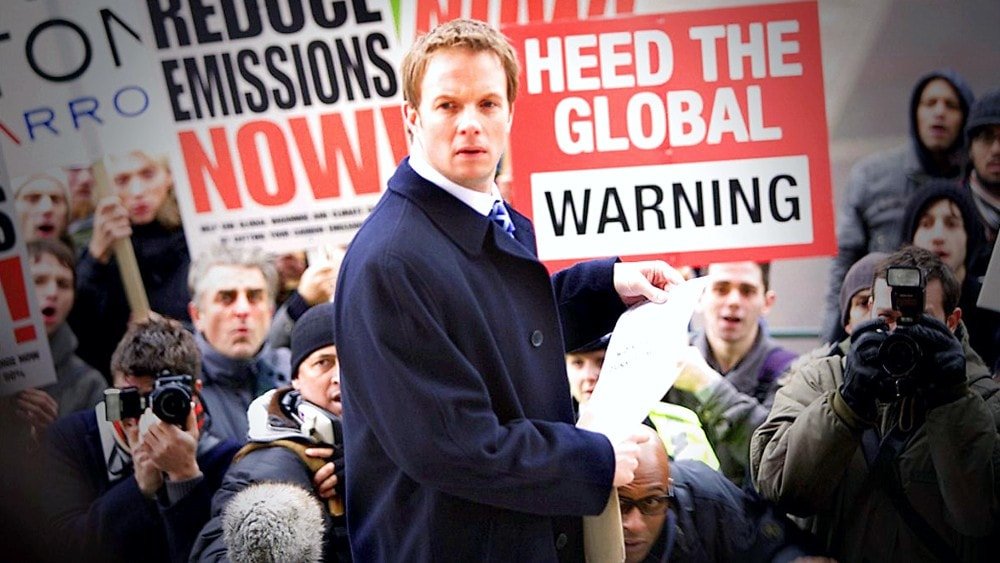
As the climate crisis heats up around them, we meet an environmental activist, oil industrialist, and politician who are all caught up in a conflict at a climate change summit.
This two-part drama is frighteningly close to home and was prophetic for 2008 when it was produced, as our protagonists are drawn into a web of conspiracy, greed, and environmental destruction.
The show takes a deep look at what the energy industry is up to and exposes some dark truths, including the lengths these companies might go to in the name of profit.
With some stellar performances from Neve Campbell and Bradley Whitford, Burn Up is a cli-fi thriller gem.
Snowpiercer, TNT (2020 – 2022)

Based on the acclaimed French graphic novel Le Transperceneige by Jacques Lob, Snowpiercer is a must-watch for cli-fi fans.
As the world is enrobed in a snowy white second ice age, the uninhabitable climate is escaped only through passage aboard the Snowpiercer – a futuristic train that never stops moving as it circles the globe, piercing the snowy veil that grips the planet.
The show creates an intense microcosm of classism as we quickly learn that this miracle train is not all it is said to be.
As the wealthy languish in luxury cabins and dine in lavish meals, the poor passengers are subjected to horrible living conditions and horrors that the show deftly navigates.
The tension builds and soon an uprising rocks the ranks of the train, as the aging miracle Snowpiercer train ages and the human cost of survival becomes apparent.
This is a very dark show, with a creative premise that asks what humanity is capable of in the face of climate change and apocalyptic conditions.
V-Wars, Netflix (2019)

Humanity is brought face to face with the consequences of its actions as a deadly virus is unleashed from melted ice due to climate change.
This prion-like virus turns humans into vampires, the emergence of which sees civilization broken into two warring factions: Blood and anti-Blood.
At the heart of the show are two best friends, Dr. Luther Swann, and his best friend Michael Fayne are pitted against each other when Michael is exposed to the virus and subsequently becomes a predator with murderous intent.
As Luther races to find a resolution, the vampire population grows at an alarming rate.
Incorporated, Syfy (2016 – 2017)
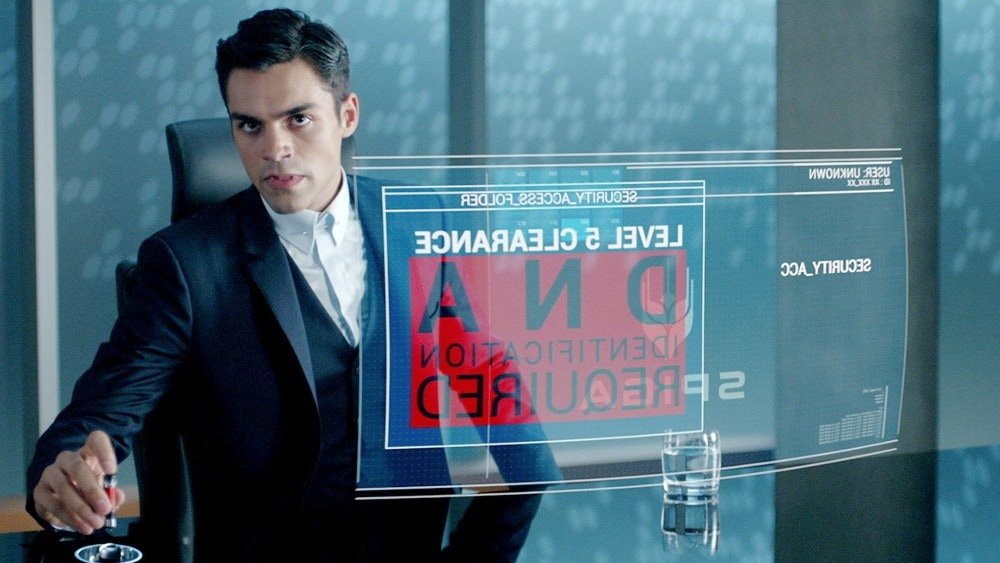
In the year 2074, the world is on the brink of collapse as countries face financial ruin due to climate change.
Due to this, the new power no longer lies within the government but with multi-national companies that control the flow of money and resources.
Having established safe spaces called “green zones”, these companies enjoy unchecked power and lawlessness.
In one of these green zones, we meet Ben Larson, a red zone refugee searching for his lover Elena – who is now employed as a brother in a green zone.
However, in order to save her, our protagonist has to play the game and become as ruthless as the executives he loathes so much.
How long until it is no longer a game and the corruption of the green zone incorporates him too?
Thin Ice, Apple TV+ (2020)
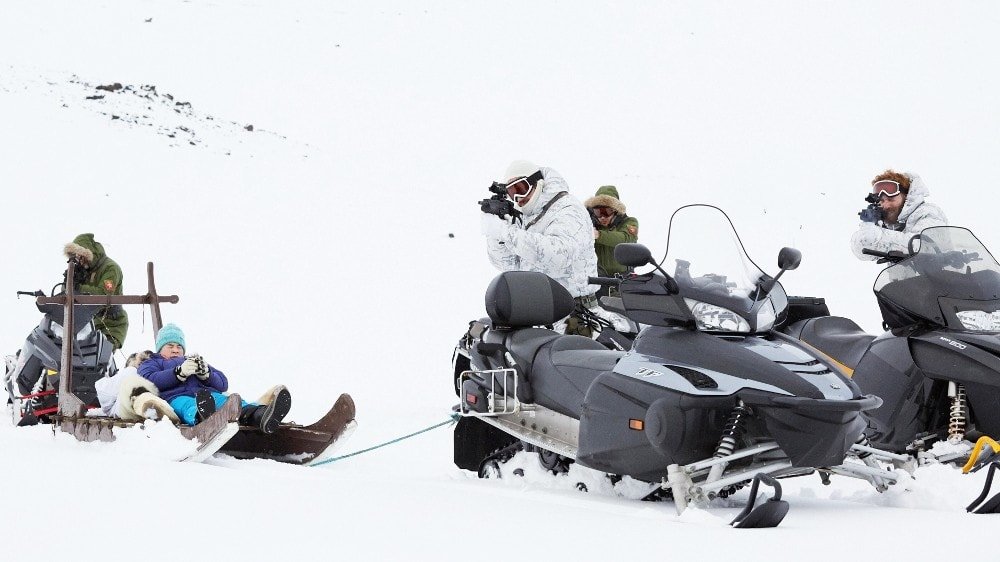
The politics of climate change makes for a tense viewing in Thin Ice, as a Swedish oil research vessel is attacked, sending our protagonist Liv to the village of Tasiilaq to investigate and track down the kidnapped crew members.
As she digs into the motivations for this crime, she uncovers a far darker conspiracy: there are no phones and internet in this small town and it appears as though the witnesses of the conspiracy she is embroiled in are being killed.
The show premiered on Earth Day and featured a stern message about the Arctic climate and the consequences of ignoring it in favor of profit.
Thrilling, thought-provoking, and deeply moving.
The Last of Us, HBO (2023 – present)

Based on the phenomenally successful video game of the same name, The Last of Us is a post-apocalyptic zombie feature with an incredibly moving cast of characters and plot.
Following rising temperatures and climate change, a zombie-like fungal outbreak collapses the world as we know it.
Victims of the virus become violent and only want to continue the spread of this pathogen.
Amid all this chaos we meet Joel, a survivor who has seen more violence than one man ought to in a lifetime.
He is tasked with helping young Ellie escape a quarantine zone, however, the show takes a deeply emotional turn as they make their journey across a blood-soaked and violently destroyed America.
BONUS: NOT SO SCI-FI TV SHOW ABOUT CLIMATE CHANGE
High Water, Netflix (2022)

Perhaps one of our earlier warnings about climate change, the 1997 Central European flood was a devastating event for those who witnessed its progress through Poland, the Czech Republic, and Germany.
In High Water, we encounter a story inspired by these historical events as we follow the days before the flood reached Wrocław, Poland.
Though not a documentary, the show does not shy away from portraying the reality of the events and the incredibly difficult decision that had to be made.
In order to save lives, officials need to decide which historical buildings and fields to sacrifice to the rising flood wave, as well as facing their own incompetencies and personal biases.